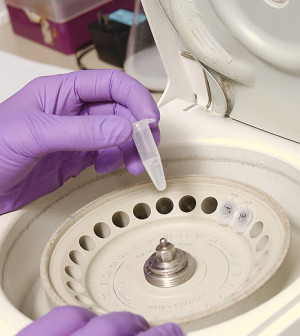- Could Your Grocery Store Meat Be Causing Recurring UTIs?
- Are You Making This Expensive Thermostat Error This Winter?
- Recognizing the Signs of Hypothyroidism
- 10 Strategies to Overcome Insomnia
- Could Artificial Sweeteners Be Aging the Brain Faster?
- Techniques for Soothing Your Nervous System
- Does the Water in Your House Smell Funny? Here’s Why
- Can a Daily Dose of Apple Cider Vinegar Actually Aid Weight Loss?
- 6 Health Beverages That Can Actually Spike Your Blood Sugar
- Treatment Options for Social Anxiety Disorder
Antibody May Lower Rejection Rates After Stem Cell Transplant in Leukemia Patients

People with acute leukemia who were given antibody therapy before a stem cell transplant fared better than those who didn’t receive the treatment, a small study found.
Stem cell transplantation allows doctors to give higher doses of cancer-killing chemotherapy, according to the American Cancer Society. However, the odds of the body rejecting the transplanted stem cells are very high — a condition called graft-versus-host disease, the study authors explained.
By treating patients first with animal-derived antibodies, called antihuman T-lymphocyte immune globulin (ATG), the researchers were able to lower the threat of rejection in patients.
“Graft-versus-host disease is the most serious complication after stem cell transplantation,” said lead researcher Dr. Francesca Bonifazi, from the Institute of Hematology at Bologna University in Italy.
“Using [ATG] reduces the risk of complications of stem cell transplants without increasing the risk of leukemia recurrence and infections,” she added.
After an average follow-up of two years, 32 percent of the patients given ATG had chronic graft-versus-host disease. But, almost 69 percent of patients who weren’t given ATG had graft-versus-host disease, Bonifazi said.
“Stem cell transplantation is a curative option for several blood diseases and for acute leukemia in particular, which represents the most frequent indication for transplant,” she said.
“The risk of severe complications that can be life-threatening or severely affect the quality of life can be significantly reduced without decreasing transplant efficacy,” Bonifazi said.
The findings was published Jan. 7 in the New England Journal of Medicine.
The study included 168 leukemia patients treated at 27 different centers. The volunteers were randomly assigned to receive ATG or not.
At two years, the survival rate was similar in patients who received ATG or didn’t. But, the rate of survival in which they were free from chronic graft-versus-host disease and cancer recurrence was significantly better among patients given the antibody — 37 percent versus 17 percent, the researchers found.
“Here, by using [ATG] prior to transplant, we show that the risk of chronic graft-versus-host disease is significantly reduced without an increase of cancer relapse,” said study co-author Dr. Nicolaus Kroger. He is director of the department of stem cell transplantation at University Hospital Hamburg-Eppendorf in Hamburg, Germany.
Lee Greenberger is chief scientific officer for the Leukemia and Lymphoma Society, based in White Plains, N.Y. Commenting on the new research, he said that “chronic graft-versus-host disease, which can occur after transplantation for the treatment of leukemia, continues to be a major limitation to conventional transplantation therapy. This study demonstrates that this antibody appears to significantly reduce the incidence of chronic graft-versus-host disease, and may improve the quality of life without a negligible effect on survival.”
Greenberger added that “this advance, coupled with previous studies and other ongoing trials with this antibody in transplant, may be of significant benefit to patients with blood cancer in need of a bone marrow transplant.”
More information
Visit the U.S. National Cancer Institute for more on leukemia.
Source: HealthDay
Copyright © 2026 HealthDay. All rights reserved.










